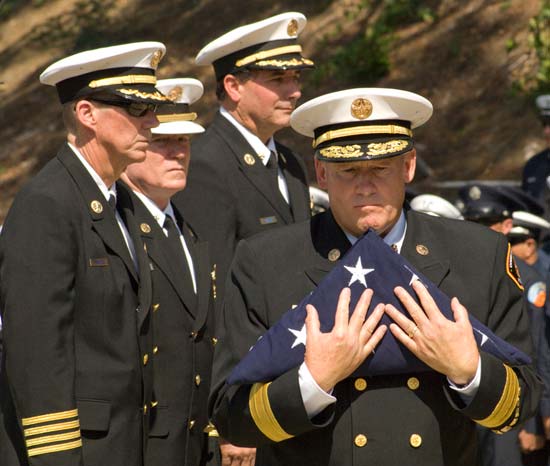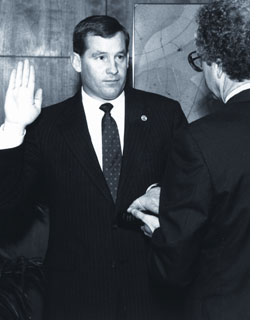County fire chief says he enjoyed the ride but it’s time to go [updated]
December 3, 2009
Considering when to step down, L.A. County Fire Chief P. Michael Freeman thought about a white-water raft trip.
You can ride the raft too long, enticed by the prospect of more rapids around the bend. Or you can navigate to a calm spot and step ashore, making sure you don’t rock the boat for those still on board.
Freeman thinks he’s found that calm spot. Last month, the chief, 64, announced he’d be leaving in March from a job he’s held since 1989. That makes him the second longest-serving L.A. County fire chief—an almost unheard-of tenure for the top firefighter of a large urban area.
“Twenty-one years is a good run,” he said in an interview this week. “I think the organization would benefit by someone new stepping in.”
Freeman believes he’s leaving the 4,400-person department when “things are stabilized for a good period of time,” allowing Supervisors to pick his successor calmly and deliberately. By announcing now, he’ll be leaving between fire seasons, with the department’s $970 million budget in relatively good shape for the next few years. “I think we’re as stable on this white water raft as we can be,” he said.
That said, Freeman hasn’t been shy about roiling the waters on his way to retirement. In the aftermath of this summer’s Station Fire—the county’s largest ever—he bluntly called for reforms in the way the U.S. Forest Service fights fires in the Angeles National Forest.
All told, the Station fire incinerated 250 square miles, destroyed 96 homes and claimed the lives of L.A. County Fire Captain Ted Hall, 47, and Specialist Arnie Quinones, 34, who were trying to find an escape route for inmates at a fire camp—“very much of a personal loss that I feel and that all of the firefighters feel.”
Among other things, Freeman publicly urged the Forest Service to allow more night flights of firefighting aircraft on federal lands. He said such a practice is routine for county choppers on state or county land, weather permitting. He also proposed that helicopters and planes controlled by federal rules be allowed to fly at dawn to take advantage of the higher humidity and lower winds.
Freeman knew his proposed reforms might cause bad blood with federal officials and fuel public anger that had built over the lack of nighttime firefighting, which was being partially blamed for the blaze’s toll. But, Freeman said, “I felt that I had a duty and a responsibility to take a good hard look at everything about the fire.”
Based on a November report from Freeman, the Board of Supervisors last week asked Congress and the U.S. Department of Agriculture (the Forest Service’s parent department) to implement his recommendations. This week, the Forest Service announced it will review its fire-fighting policies in the national forest, including the night-flight restrictions.
Looking back over his career in Los Angeles, Freeman is proud of what he sees as the department’s gains in firefighting expertise, equipment and growth. He’s also overseen the broad expansion of paramedic services, including more airlifts and specialized services to stabilize patients on the way to emergency rooms and trauma units.Raised in Texas and hired after 24 years in the Dallas Fire Department, Freeman says he faced a “steep learning curve” when he arrived as the only outsider ever hired as an L.A. chief. He says hiring an insider would ease the transition for his successor. Declining to name names, he said there are “absolutely are viable, capable candidates inside the organization” and that a nationwide search is unnecessary.
Freeman knows that he’s going to miss the day-to-day camaraderie of the department. The emotional payoff will be tough to match, too. “I get a lot of satisfaction out of dealing with an ongoing series of challenges in a relatively orderly fashion.”
During his two decades at the top of the organization, Freeman gained a reputation as a hands-on boss, a micro-manager in the view of some in the department. Freeman jokingly described his management style as “hellish.” But he said he limits his tendency to “get down in the weeds” to key areas. He said he pays very close attention to “critical issues” with broad impacts, as well as to situations the department hasn’t previously faced. He said he also jumps in when he thinks his managers’ “strategic view is too short-sighted” after they propose solutions that may fix one problem but create another.
Given his energy, few people expect Freeman to morph into a quiet retiree. He said he won’t take another job or wile away afternoons on the golf course (“I don’t like golf, and I don’t want to start playing now,” he explained.)
But look for him to devote more time to the Catholic Church in his Whittier parish, where he’s a deacon. He’s got a grandchild due in January, and said he’d like to split time between L.A. and a house he and his wife bought north of Dallas.
After all those years of late nights and emergency calls, he vowed to “find a little different pace” by being home in the evenings with his wife of 41 years, Cathy Freeman. In fact, he said, “last night, we actually did eat together.”
It’s a good start.
[Updated 12/22]
Uh, never mind—for now.
Chief Freeman has decided not to call it quits in March. The chief, who has served two decades in the department’s top position, says he started getting worried on Friday about the timing of his exit. That’s when he says he received “some significant news” that property tax revenues for his department would be $16 million less than predicted—a foreboding figure since that pot of money funds about 70 percent of the agency’s operations.
“For any new fire chief, from inside or outside the department, that is a huge, ugly responsibility to have to face as a first step,” says Freeman, 64.
“Fortunately—and unfortunately—I’ve been through this before.
“After 21 years, I want to leave on as positive a note, and with as a good a feeling, as I can conjure up. I was right there until this [financial news] came along. I’d like to row a few more yards with things. It’s not like I feel I’m the only person who can do it. We’re just heading for some rough seas.”
Freeman compared his decision and the department’s money woes to the strategy of fighting a house fire. First, he says, you extinguish the immediate blaze in the room and then you check to see whether flames moved into the walls and attic.
“I thought I had the thing knocked down,” he says. “But I didn’t.”



















 405 bridge work causes a stink
405 bridge work causes a stink
